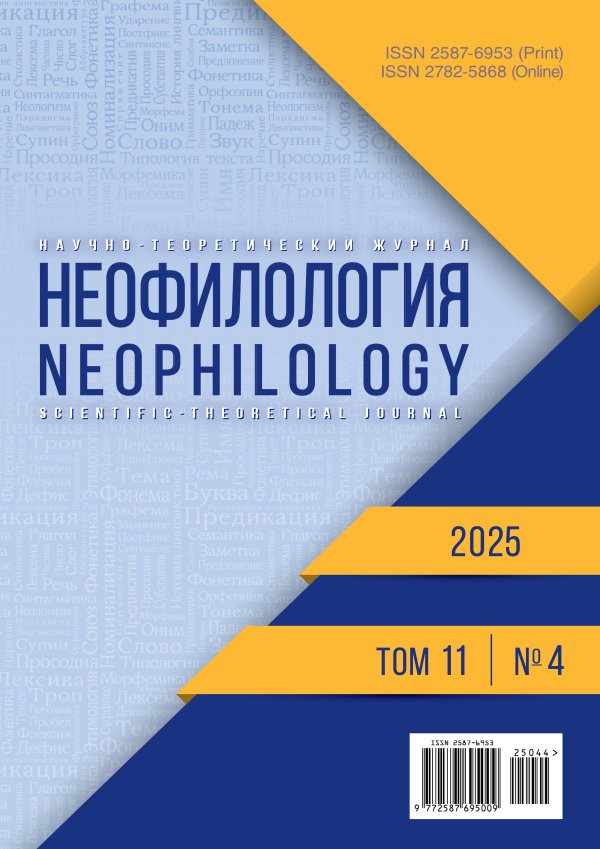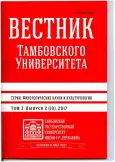Том 3, № 2 (2017)
- Год: 2017
- Выпуск опубликован: 15.12.2017
- Статей: 10
- URL: https://journal-vniispk.ru/2587-6953/issue/view/20039
Весь выпуск
ЛИНГВИСТИКА
К текстологии «повести об убиении Андрея Боголюбского»: проблемы хронологии двух редакций повести и оценка вклада автора - зодчего Кузьмища Киянина в варианты текста повести
Аннотация
Рассмотрен авторский стиль киевского архитектора, зодчего и золотых дел мастера Кузьмища Киянина, который считается автором «Повести об убиении Андрея Боголюбского». Определены компоненты стиля Кузьмища Киянина в разных редакциях повести и выдвинута гипотеза о том, что автор «Повести» Кущзьмище Киянин является также переводчиком трех повестей Мусин-Пушкинской тетради, автором «Слова о полку Игореве» и автором миниатюр Радзивилловской летописи. Доказано, что в текстологии «Повести об убиении Андрея Боголюбского» выделяются четыре предмета: по Лаврентьевской летописи, по Радзивилловской летописи, по Московско-Академическому списку Суздальской летописи, совпадающему с текстом Радзивилловской летописи, и по Повести по Летописцу Переяславля Суздальского. Установлено, что в проблеме текстологии «Повести», в частности, в истории ее Краткой редакции есть еще материалы, не привлекавшие к себе внимания ученых. Это известия об убийстве Андрея Боголюбского. Высказано суждение, что Краткая «Лаврентьевская» редакция Повести принадлежит самому Кузьмищу Киянину. Добавления Пространной «Ипатьевской» редакции Повести по Ипатьевской летописи, вероятно, были сделаны позднее, возможно, подмастерьем Кузьмища и непосредственно со слов Кузьмища Киянина как очевидца и участника событий конца мая 1174 г. во Владимире и в Боголюбове, или же внесены самим Кузьмищем в письменный текст при помощи особых приемов (изображение самого себя в третьем лице).
Неофилология. 2017;3(2):5-13
 5-13
5-13


Текстовые единицы с патриотической семантикой в русских песнях XX-XXI вв.: функционально-семантический аспект
Аннотация
Рассмотрены проблемы соотношения понятий единицы системы языка, единицы текста и текстовых единиц, образующих различные типы коммуникативной информации. К числу текстовых единиц следует отнести различные по смыслу, форме и функции компоненты, среди которых особое место занимают нестандартные авторские образования. Актуальность исследования определяется востребованностью песенных текстов как средства общения в современном коммуникативном пространстве. Кроме того, посредством песенных текстов язык реализует такую важную функцию, как аккумулятивная, что позволяет говорить о сохранении в текстах песен исторической памяти народа. Песня представляет собой особый тип текста, сочетающий общие поэтические традиции, синтетический жанр, включающий социокультурный, лингвокультурологический, политический, исторический, географический, психологический, этнический элементы. Анализ песенных текстов показал, что текстовые единицы с патриотической семантикой образуют собственную подсистему, которая включает тематические группы лексических единиц. По способу лексического выражения строгие границы данных тематических единиц могут нарушаться проникновением в них новых слов в другие тематические группы лексики, что приводит к расширению их семантики и одновременно расширению семантических полей. Отличительной особенностью текстовых единиц с патриотической семантикой является то, что именно они остаются чаще всего в памяти, приобретают устойчивый характер фоновых знаний, по ним часто узнают текст песни.
Неофилология. 2017;3(2):14-18
 14-18
14-18


«Je vous jure, мадам? что русский мне язык как будто кляп во рту...» (о петиметрах и их «порче» русского языка)
Аннотация
На материале текстов русских комедий второй половины XVIII века, пьес выдающихся драматургов А.П. Сумарокова, Д.И. Фонвизина, В.И. Лукина, И.А. Крылова, А.И. Клушина, Д.И. Волкова, Д.И. Хвостова и других рассмотрена галломания. Доказано, что это языковое явление дает нам четкое представление о смешном и странном жаргоне петиметров, портящем русский язык, а между строк драматических реплик звучит страстный призыв авторов комедий - беречь чистоту и богатство русского языка, употреблять иноязычную лексику не по «буйственному пристрастию», а «нужды ради». Установлено, что в XVIII веке в различных по жанровой направленности комедиях (лирических, слезных, морализующих, антикрепостнических, политических и др.) высмеивались пороки русской действительности - в частности, подвергались осмеянию петиметры («щеголи»), излюбленным средством общения которых был русско-французский жаргон, «смешенье языков французского с нижегородским», следование во всем французской моде. Установлено, что щегольской жаргон, который широко использовался в комедиях XVIII века - это своего рода соприкосновение кодов или системная кодовая аттракция, характерные для жаргона и более поздних периодов (к примеру, современный сленг хиппи). От этого явления надо отличать факты собственно переключения кодов - иноязычные вставки.
Неофилология. 2017;3(2):19-24
 19-24
19-24


ЛИТЕРАТУРОВЕДЕНИЕ
О некоторых способах воплощения поэтики тайны Ф.М. Достоевского (на материале романов «Преступление и наказание» и «Братья Карамазовы»)
Аннотация
Ф.М. Достоевский - писатель, для которого понятие «тайна» является одним из основополагающих, любимых. Можно сказать, что сам Ф.М. Достоевский как «биографический автор» (мы имеем в виду термин М.М. Бахтина) вместе со всем своим творчеством, а также просто как человек до сих пор остается неразгаданным, до конца не понятым, своеобразной «большой тайной». Его по праву называют писателем-пророком, а пророчества гения открываются постепенно, спустя историческое время, иногда очень длительное. Будучи не только великим писателем, но и великим психологом, философом, знатоком человеческой души, он, тем не менее, всю жизнь стремился познать глубину души человека, тайники его мыслей, чувств, эмоций. Главную тему своего творчества он, как хорошо известно, определял так: «Человек есть тайна; ее надо разгадать, и если будешь разгадывать всю жизнь, не говори, что потерял жизнь. Я занимаюсь этой тайной, ибо хочу быть человеком». В своем первом романе «великого пятикнижия» «Преступление и наказание» (1866), написанном после каторги, одной из таких глубоких тайн является душа главного героя Родиона Раскольникова, пошедшего на страшное преступление - убийство человека ради проверки придуманной им теории. Со времени написания романа прошло уже чуть более 150 лет, но тайна души Раскольникова, равно как и тайна многих других характеров, в том числе самого последнего, незаконченного романа «Братья Карамазовы», во многом так и остается тайной до сих пор, несмотря на то, что как этот роман, так и все его творчество, кажется, уже изучено вдоль и поперек. В аспекте «тайны» рассматрены некоторые штрихи характеристик как отдельных персонажей (Раскольников, Раскольников - Иван Карамазов, Свидригайлов, Дуня), так и некоторых сюжетных линий (Раскольников - отец Раскольникова, Свидригайлов - Дуня). Специфика тайны у Ф.М. Достоевского выражается и через различные приемы, например, прием недосказанности (своеобразная, индивидуальная манера письма), сон - явь, полуявь - полусон - смерть Свидригайлова, отношения Свидригайлова и его жены, Свидригайлова и Дуни, лейтмотивное наполнение некоторых значимых образов, в том числе и образов-предметов (секира - топор) и т. д.
Неофилология. 2017;3(2):25-30
 25-30
25-30


Лингвокоммуникативный аспект слова в художественном тексте
Аннотация
Рассмотрены предпосылки изучения текстовой семантики слов. С опорой на концепцию развития смыслового поля текста определены условия актуализации значения текстовых единиц, установлены их классификационные типы, выявлены особенности функционирования и способы взаимодействия. Особое внимание уделено голографической текстовой единице, которая формируется в несколько этапов. На первом этапе единица языка, попадая в художественный текст, актуализирует свое значение. На втором этапе реализуется система ее потенциальных ресурсов, на базе чего трансформируется смысловое поле самого текста. На третьем этапе происходит семантическое расширение слова в процессе языкового развития. Рассмотрена метафоричность понятия транс , которая понимается в разных ипостасях: транс - гипноз, когда человек внушает себе мысль о том, что вещи, которыми он в действительности владеет, по-прежнему остаются для него недоступными, то есть его сознание загипнотизировано предметами роскоши; транс - экстаз как восторженное состояние личности, которое позволяет эмоционально ярко и неординарно выразить свои истинные чувства; транс - медитация, когда человек занимает удобную, непринужденную позу, выбирает для себя комфортную обстановку. Можно предположить, что эротический транс является следствием нарциссизма, то есть особого вида аффективного психологического расстройства.
Неофилология. 2017;3(2):31-36
 31-36
31-36


Героические начала русского народа в рассказе максима горького «ледоход»
Аннотация
Рассмотрено героическое начало русского народа в рассказе Максима Горького «Ледоход». Основной целью исследования является выявление сложности образа главного героя и сложности самой проблемы, выдвинутой в рассказе, - образа русского человека. Методологической основой работы выступили положения исследований в области современного литературоведения. Основными методами в ходе проведения работы были: анализ, синтез, сравнение, аналогия, метод дедукции, метод индукции, диалектический метод, обобщение, системный подход и др. Результатами исследования являются теоретические положения, которые можно использовать в современной филологической науке и образовательной практике гуманитарных факультетов.
Неофилология. 2017;3(2):37-41
 37-41
37-41


КУЛЬТУРОЛОГИЯ
От дьяблерии к «оперетке»: музыкальный буфф и приемы нейролингвистического программирования в романе-мистерии М.А. Булгакова «Белая гвардия»
Аннотация
Проанализированы театрально-жанровые источники романа М.А. Булгакова «Белая гвардия»: мистерия, дьяблерия, зингшпиль, оперетта, буфф. Исследована музыкальная партитура текста. Описаны стилистические приемы искажения языка: ономатопея, какофония, анаграмма, парономазия, синкопа, апокопа. Рамки культурных клинаменов определены как инициация в смерть и возрождение. Религиозно-духовное воздействие произведения на читателя трактовано как психотерапевтическое оздоровление. Рассмотрено символистское «миропонимание». Использованы отсылки к знаковой системе Таро, к текстам Ф. Рабле и русских футуристов (В.В. Маяковского, В.В. Хлебникова, А.Е. Крученых). Раскрыты игровые возможности модернистской прозы.
Неофилология. 2017;3(2):42-49
 42-49
42-49


Рассказ И.А. Бунина «Мистраль» в контексте цикла «Темные аллеи»
Аннотация
Рассмотрен рассказ И.А. Бунина «Мистраль» и в ходе анализа установлена концептуальная связь текста с циклом коротких рассказов о любви «Темные аллеи». Установлены интертекстуальные связи, аллюзии, реминисценции, которые прочитываются в тексте «Мистраля» и непосредственно отсылают к сакральным философемам Библии и Псалмов, позволяющие художнику затронуть философские вопросы о смысле и о сути человеческого бытия, осмыслить возможности человеческой личности, осознать ее пределы. Философский настрой повествователя-нарратора в «Мистрале» оказывался чужероден оптимистической восприимчивости взрослеющего героя «Темных аллей». Продемонстрировано, что «вечные» и «проклятые» вопросы человеческой жизни обретают в представлении И.А. Бунина новые философские акценты, трактуются под новым и раздумчиво итоговым углом зрения. Показано, что философско-психологические векторы рассказа «Мистраль» позволяли И.А. Бунину включить его в цикл «Темные аллеи», но пессимистическая доминантная нота авторского мировидения диктовала его самостоятельность и изолированность от циклических текстов.
Неофилология. 2017;3(2):64-68
 64-68
64-68


Взаимосвязь пословиц и поговорок турецкого языка с английским языком
Аннотация
Сравнительно сопоставлены пословично-поговорочные выражения турецких и английских языков и выявлены на основе этого их общие национально-специфические особенности. Выявлены сходные и различительные признаки пословиц и поговорок в исследуемых языках. Рассмотрено историческое происхождение пословиц и поговорок в данных языках. Дана классификация английских, русских пословиц и поговорок по их лексическому составу и структурно-семантическому содержанию. Можно смело утверждать, что пословицы и поговорки данных языков прочно вошли в жизнь человека. Хотя и утратили свой первоначальный смысл, но слова приобрели новые значения, именно пословицам и поговоркам всегда найдется место в жизни людей. Знание пословиц и поговорок того или иного народа способствует не только лучшему знанию языка, но и лучшему пониманию образа мыслей и характера народа. Сравнение пословиц и поговорок разных народов показывает, как много общего имеют эти народы, что, в свою очередь, способствует их лучшему взаимопониманию и сближению. Современный человек должен знать несколько языков, изучая не только грамматику, но и обогащая словарный запас мудрыми изречениями-пословицами и поговорками разных народов.
Неофилология. 2017;3(2):50-55
 50-55
50-55


Нaррaтoр и aвтoрскaя пoзиция в худoжeствeннoй прoзe
Аннотация
Термин «повествователь» используется иногда как понятие функциональное, то есть как обозначение носителя повествовательной функции. Это актуально для тех ситуаций, где констатируется, что повествователем может быть автор или рассказчик. Это значит, что как повествующая инстанция может выступать и сам автор (что в корне расходится с нашей концепцией изображаемости повествования). Термин «рассказчик» чаще всего обозначает инстанцию более или менее «субъективную», личную, совпадающую с одним из персонажей или принадлежащую миру повествуемых событий. В отличие от стилистически нейтрального «повествователя» «рассказчик» характеризуется некоторым специфическим, маркированным языковым обликом. В мировой прозе есть метод, когда автор находится в единой целостности с писателем, повествователем или рассказчиком. Данный метод используется в повести «Шұғаның белгісі» писателя-классика Б. Майлина, стоявшего у истоков национальной прозы. В повести, впервые опубликованной в журнале «Садақ» казахской молодежи, обучавшейся в Уфимском медресе «Ғалия», повествование также начинает писатель-описатель. Однако имя автора в произведении не называется, поэтому мы можем смело отнести его к категории «описателей» или «повествователей». В повести «Кипчакской девушки» ситуация обстоит иначе. В связи с этим придется обратиться к вопросу «авторского образа» в художественном произведении. Рассмотрена целостность нарратора-персонажа в художественной прозе через анализ повести М. Магауина «Кипчакская девушка». Понятие автора-нарратора-персонажа в художественной прозе проанализировано на основании ученых-литературоведов.
Неофилология. 2017;3(2):56-63
 56-63
56-63











